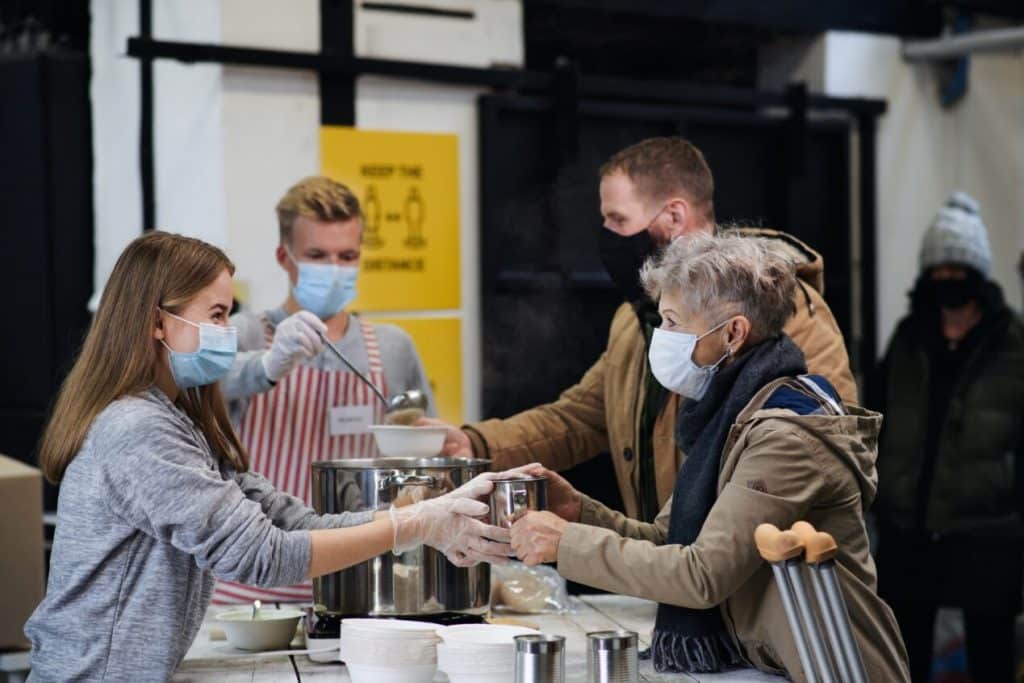
Nils von Kalm
26 August 2023
The cost-of-living crisis Australians are facing is causing huge anxiety for many people. The increases in rents, interest rates, and utility bills are putting pressure on all of us. For many, life is currently a struggle just to find enough money for the essentials.
Our natural tendency at times like this is to look inward, bunker down and do our best to look after ourselves until conditions improve.
Despite the difficulties we face, we still live in a country with great privilege and access to opportunity. Australia outperforms the average in income, jobs, education, health, environmental quality, social connections, civic engagement, and life satisfaction, according to the Organisation for Economic Co-operation and Development Better Life Index. We have access to fresh water, food and healthcare in ways many people don’t. We have freedom of movement, and live at peace.
Read more: Financial hardship this Christmas highlights need for more support for the vulnerable
Of course, many Australians do not experience this privilege. For instance, Indigenous Australians experience discrimination, racism, violence – and a huge gap in life expectancy, among other issues.
But for most of us, we have been lucky enough to be born in or migrated to a nation of where we live in safety, with all we need. This certainly been my experience. Being born here has given me opportunities I might not have experienced in many other parts of the world.
With this in mind, what should those of us with privilege do with our good fortune? How do we live in a way that is Godly, and gives something back to a society that has given us so much? In Luke 12:48, Jesus says that to those who have been given much, much is expected. How do we live that out?
If I am to take seriously my life as a follower of Jesus, it makes sense to go where he went. After his resurrection, as he was preparing to leave this world, Jesus said to his disciples, “as the Father has sent me, so I send you”. So, where was Jesus sent? Well, he was known as a friend of the unloved, the outcast and the despised.
Many Christians throughout history have taken up this mantle to go where Jesus was sent. Mother Theresa went to the dying in the slums of Kolkata, Francis of Assisi gave up all his possessions, and John Smith, the founder of God’s Squad Christian Motorcycle Club, went to outlaw bikers and other misfits of society. It was Christians who widely developed hospitals and universities and who set up charities. It is still the case that the majority of the most well-known charitable institutions in Australia have Christian roots.
Read more: Volunteers needed for seafarers’ support services
As a person of relative privilege, I am convinced that we are called to use our privilege for the good of others. It was Bono, the lead singer of the band, U2, and activist for the poor, who has said he wants to use his fame as currency, to give back what has been given to him. That’s a wonderful example to follow. After all, Jesus said the whole Law and the Prophets was summed up in the command to do unto others as we would want them to do for us. For Jesus, it was all about loving God and neighbour, including our enemies.
So, what does this look like practically?
Part of going where Jesus was sent can include giving a voice to the voiceless. During my time working in aid and development over the last couple of decades, I was fortunate to visit the Gaza Strip and see firsthand the plight of Palestinians and how they live in the light of the occupation of their land. Gaza is the third most densely populated region on the planet, 95 percent of the water there is undrinkable, unemployment is as high as 50 percent, and half of all children there have expressed no will to live. It’s also a conflict zone.
When I was in Gaza, my own sense of privilege struck me deeply. During my second trip there, in 2018, Gaza came under attack from Israeli bombs. The hotel that I and my colleague was staying in shook as bombs dropped around the city. Needless to say, it was a scary time. We were asked if we wanted to leave, but we chose to stay to do what we could to continue our work with women experiencing breast cancer.
The fact that I could have left at any time though reveals how privileged I am. The people who live in Gaza can’t leave. They are trapped in what is commonly called the world’s largest open-air prison. Regular bombings are just part of life for them.
Read more: Churches uniquely suited to help support refugees and asylum seekers
What the local people did ask us to do was to go back home and tell their stories. People living under oppression and without privilege, just like the rest of us, just want to be heard and seen. They want the world to know what is happening.
Jesus allowed the unheard to be heard through his acts of compassion and the fact that he, as God incarnate, “emptied himself” as Philippians 2 tells us, thereby showing the way for us to follow.
It is not enough to just be aware of our privilege here in Australia. Following Jesus, loving our neighbour, means telling the stories of the unheard, giving a voice to those who are voiceless, and making sacrifices for those less privileged than us. It involves doing all we can to work for the reign of God on earth as in heaven, as we pray each week in the Lord’s Prayer. By doing so, we will be participating in the healing of the world and working for that day we read of in Revelation 11:15, when the kingdom of the world has become the kingdom of our Lord, and he will reign forever and ever.
Nils von Kalm is a Melbourne writer who focuses on the links between Christian faith and culture. He can be found online at linktr.ee/nilsvonkalm
For more faith news, follow The Melbourne Anglican on Facebook, Twitter, or subscribe to our weekly emails.






